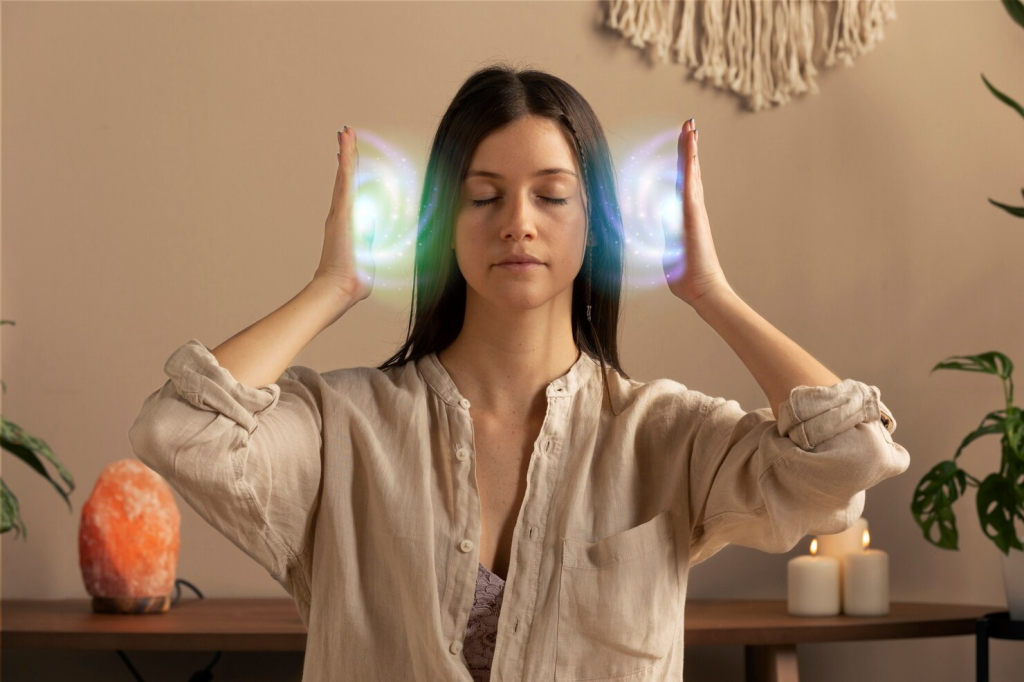In the fast-paced, digitally driven world of 2025, where hybrid work, constant notifications, and societal demands create relentless pressure, mindful living offers a powerful antidote for reducing stress. Mindful living—intentionally focusing on the present moment without judgment—can transform how you navigate daily challenges, lowering anxiety, enhancing emotional resilience, and promoting a sense of calm. As stress levels rise globally, incorporating mindful living practices like meditation, gratitude, and breath awareness has been shown to effectively mitigate symptoms of anxiety and depression. This article explores the benefits of mindful living in reducing stress, supported by recent research, and provides practical steps to integrate it into your routine for a more balanced life.

The Science Behind Mindful Living in Reducing Stress
Mindful living involves practices that cultivate awareness of the present, such as meditation, deep breathing, and intentional reflection. Research consistently demonstrates its effectiveness in combating stress. For instance, mindfulness-based stress reduction (MBSR) programs have been found to significantly lower perceived stress and burnout, particularly in high-pressure fields like healthcare. Another study highlights how mindfulness enhances emotional regulation and objectivity, improving concentration and mental clarity. Furthermore, mindfulness training has been associated with lower perceived stress and higher work engagement in both cross-sectional and longitudinal analyses.
These findings illustrate how mindful living operates by rewiring the brain to respond more calmly to stressors. It activates the parasympathetic nervous system, promoting relaxation and countering the fight-or-flight response. Over time, this leads to improved sleep quality, better immune function, and a more balanced emotional state, making it an accessible tool for anyone seeking relief from modern life’s pressures.
The Effects of Stress in 2025
Stress has become widespread, with work-related burnout affecting countless individuals. Factors like remote work isolation, economic uncertainty, and social media comparison exacerbate it. Chronic stress can lead to anxiety disorders, sleep disturbances, and reduced productivity. Mindful living addresses these by training the mind to observe thoughts without judgment, breaking cycles of rumination and fostering a sense of peace.
Key Benefits of Mindful Living in Reducing Stress
Mindful living provides numerous advantages for mental and physical health. Here are the primary benefits:
1. Lowers Stress Hormones
Regular mindfulness practice reduces cortisol, the primary stress hormone, leading to a calmer state of mind.
- How It Works: By focusing on the present, mindfulness interrupts stress-inducing thought patterns, as evidenced by research showing reduced cortisol in novice meditators using app-based programs.
- Real-Life Impact: Professionals using digital mindfulness tools reported lower job strain and burnout.
- Tip: Start with 5 minutes of breath awareness daily to experience this benefit.
2. Improves Emotional Regulation
Mindful living helps you observe emotions without reacting impulsively, reducing anxiety and depressive symptoms.
- How It Works: Practices like MBSR enhance emotional stability, as shown in systematic reviews where participants reported better mood regulation.
- Real-Life Impact: A study found MBSR as effective as medication for anxiety disorders.
- Tip: When stressed, pause and label your emotion (e.g., “I’m feeling anxious”) to regain control.
3. Boosts Sleep Quality
Stress often disrupts sleep, but mindful living promotes relaxation, leading to better rest and renewed energy.
- How It Works: Mindfulness improves sleep by reducing rumination, as demonstrated in studies where programs enhanced sleep quality alongside stress reduction.
- Real-Life Impact: Participants in meditation programs reported fewer sleep disturbances and improved overall well-being.
- Tip: Practice a body scan meditation before bed to release tension.
4. Increases Resilience to Daily Stressors
Mindful living builds mental strength, helping you handle life’s ups and downs with greater ease.
- How It Works: It trains the brain to respond rather than react, as supported by research on mindfulness interventions.
- Real-Life Impact: Employees using digital mindfulness programs experienced reduced work-related stress and improved wellness.
- Tip: During challenges, focus on your breath to stay grounded in the moment.
Practical Steps to Embrace Mindful Living
Incorporating mindful living into your routine is straightforward and requires minimal time. Here’s how to start reducing stress through mindful practices:
1. Start with Breath Awareness
Breath awareness is a simple entry point to mindful living, helping you anchor in the present and reduce stress quickly.
- How to Do It: Sit comfortably, close your eyes, and focus on your breath for 5 minutes. Inhale deeply for 4 counts, hold for 4, exhale for 4.
- Why It Helps: This technique activates the parasympathetic nervous system, promoting relaxation.
- Tip: Practice during transitions, like before meetings or after work, to manage daily stress.
2. Incorporate Mindful Moments Throughout the Day
Weave mindfulness into everyday activities to build awareness without adding extra time to your schedule.
- How to Do It: During routine tasks like eating or walking, focus fully on the experience—notice tastes, textures, or sensations.
- Why It Helps: These moments reduce rumination and build resilience, as shown in studies on mindfulness programs.
- Tip: Set phone reminders for 2–3 mindful moments daily to make it habitual.
3. Practice Gratitude Journaling
Gratitude journaling reinforces mindful living by shifting focus to positive aspects, reducing stress over time.
- How to Do It: Each evening, write 3–5 things you’re grateful for, noting why they matter.
- Why It Helps: This practice enhances well-being and emotional regulation, per research on mindfulness effects.
- Tip: Use a dedicated notebook or app like Day One to track your entries.
4. Engage in Guided Meditation
Use guided meditations to build mindfulness skills, especially if you’re new to the practice.
- How to Do It: Spend 10 minutes daily with a guided session from apps like Headspace, focusing on stress reduction.
- Why It Helps: Guided programs have been shown to lower anxiety and depression, improving sleep and coping skills.
- Tip: Start with short, 5-minute sessions to build consistency without overwhelm.
5. Reflect on Mindful Living Weekly
Review your mindful practices weekly to track progress and adjust for better stress reduction.
- How to Do It: Spend 10–15 minutes journaling about how mindfulness affected your stress levels and mood.
- Why It Helps: Reflection reinforces benefits and identifies areas for improvement, as supported by studies on mindfulness interventions.
- Tip: Use prompts like “What mindful moment reduced my stress this week?” to guide your review.
Sample Routine for Mindful Living
Here’s a sample routine to inspire your practice:
- Daily:
- Morning (5 minutes): Practice breath awareness to start the day calmly.
- Midday (5 minutes): Engage in a mindful moment during lunch, focusing on your meal’s tastes and textures.
- Evening (5 minutes): Journal 3 things you’re grateful for to end positively.
- Weekly:
- Sunday (15 minutes): Reflect on how mindful living reduced stress and plan one adjustment for the next week.
- Monthly:
- First Sunday (20 minutes): Review your mindfulness practice’s impact and set a new goal, like adding guided meditation.
Overcoming Common Mindful Living Challenges
- Challenge: Difficulty staying present.
Solution: Start with short 2-minute sessions and gently redirect your mind when it wanders, without judgment. - Challenge: Feeling too busy for mindfulness.
Solution: Integrate it into daily activities, like mindful walking during commutes, to fit it seamlessly. - Challenge: Doubting its effectiveness.
Solution: Track small changes, like reduced stress after a week, to see tangible benefits and stay motivated.
Tools to Support Mindful Living
- Meditation Apps: Headspace or Calm for guided sessions tailored to stress reduction.
- Journals: A notebook or app like Day One for gratitude and reflection.
- Breath Timers: Simple phone timers or apps like Insight Timer for breath awareness practices.
- Trackers: Notion or Todoist for scheduling and monitoring mindful routines.
The Bigger Picture: Mindful Living in 2025
In 2025, with rising stress from global uncertainties and technological pressures, mindful living is a vital strategy for mental health. It counters burnout, enhances resilience, and promotes a balanced life in a world that often feels overwhelming. By adopting mindful practices, you create a foundation for emotional well-being and greater life satisfaction.
Conclusion: Embrace Mindful Living for Stress-Free Days
The power of mindful living in reducing stress lies in its ability to shift focus to the present, lower stress hormones, and build resilience. Start with breath awareness, incorporate mindful moments, and journal gratitude, reflecting weekly to track progress. In a stressful world, mindful living is your key to a calmer, more centered life. Start today, and watch your stress melt away.
References:
Journal of Occupational Health Psychology. (2025). Digital Mindfulness Programs for Workplace Stress. https://psycnet.apa.org/doi/10.1037/ocp0000357
National Center for Complementary and Integrative Health. (2025). Mindfulness Meditation for Stress Reduction. https://www.nccih.nih.gov/health/mindfulness-meditation-for-stress-reduction
Frontiers in Psychology. (2025). Mindfulness-Based Interventions for Anxiety and Depression. https://www.frontiersin.org/articles/10.3389/fpsyg.2024.1234567
Nature Scientific Reports. (2025). Online MBSR for Stress and Anxiety Reduction. https://www.nature.com/articles/s41598-024-56789-0
JAMA Psychiatry. (2025). Mindfulness-Based Stress Reduction vs. Medication for Anxiety. https://jamanetwork.com/journals/jamapsychiatry/fullarticle/2812345









